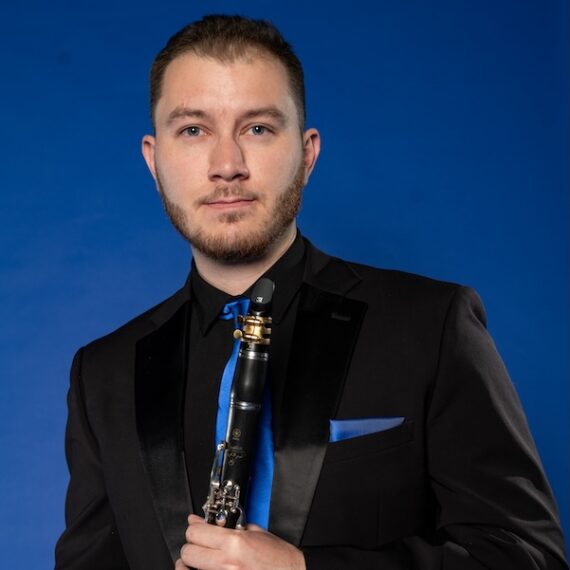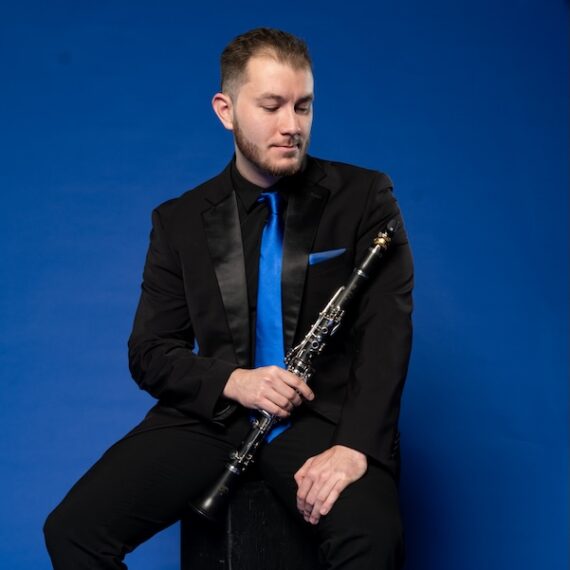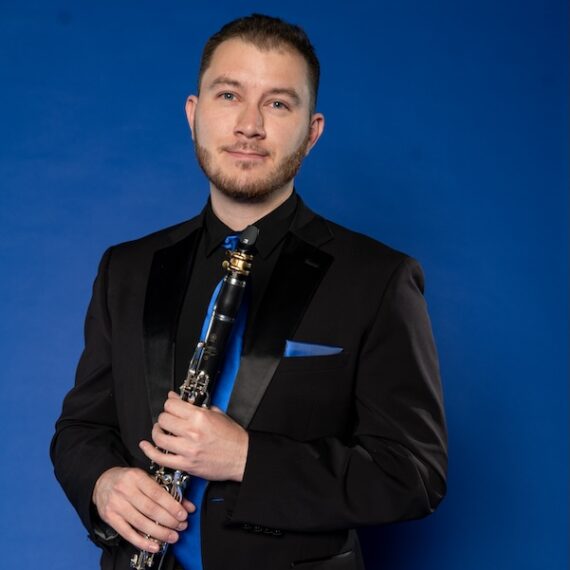Awards/Competitions
Winner, February 2024 “The President’s Own” Marine Band clarinet audition
Appearances
The Royal Conservatory Orchestra, National Orchestral Institute Philharmonic, 2024
What is your earliest memory of classical music?
Seeing my cousin perform as Floria in Puccini’s Tosca. I was a bit too young to understand.
Was there a teacher who was particularly impactful/helpful? What made this instructor stand out?
My middle school band director, Mrs. Allen, was my first inspiration and supporter. She encouraged me and helped raise my self-esteem, and was the first person to support me in choosing a career in music.
What made you decide to become a musician? Was there a particular performance or person that influenced your decision?
My best friend in middle school who was also a huge music nerd informed me that you could major in music performance in college. That kind of sealed the deal.
How did you hear about TŌN? What inspired you to apply?
I heard about it from TŌN musicians that attended the same summer festival as me. At the time, I was planning on accepting a position in the U.S. Marine Band, but after some personal events I decided instead to finish grad school and use the time to prepare for the TŌN audition.
How would you like to see orchestra concerts evolve in the future?
I would like to see more versatility in the way we perform and program for our audiences. I would like to see orchestra concerts in a different context than what we are used to seeing. That does not mean I want to do away with tradition, but there is a staleness and inaccessibility with the current performance model, and we are failing to attract broader audiences outside of the traditional community of classical music enthusiasts.
We say all the time that we need more young people to attend our concerts, but we do nothing to make the concert experience appealing to them. Let’s try to address that.
What is the most memorable performance you ever had?
My most memorable performance was when I played the principle clarinet on Rachmaninoff’s Second Symphony. It was by far the most challenging symphony I’ve played from a musical, technical, and endurance standpoint. After heavy playing in the first two movements, the solo clarinetist is expected to sing their heart out on the longest lyrical excerpt in the clarinet repertoire in the third movement. It’s definitely a piece you need to physical prepare for!
What is your proudest achievement as a musician?
My proudest achievement was winning the clarinet position in the Marine Band. It was my first professional audition and I feel lucky for that to have been the outcome.
Is there a person or people you most respect in your field and why?
I respect all the music educators who sacrifice so much to work in this broken system to teach music. If it wasn’t for my band director’s unwavering passion for music education, I may have not had the spark to pursue music.
Tell us about a time you almost gave up but didn’t.
I almost gave up after finding out I couldn’t enter the U.S. Marines. I was heartbroken and unsure I could secure another position for myself. Instead, I finished grad school and accepted a position in TŌN, and I could not be more grateful that I didn’t give up.
Can you share any memorable onstage mishaps?
During an opera, my co clarinetist’s barrel cracked during his second clarinet solo. It ruined the sound and it frightened the conductor, but luckily I kept my case on stage and was able to dig a barrell out of it during the few rests we had.
Do you have a favorite non-classical musician or band?
I am currently a huge Lana Del Rey fan.
If you weren’t a musician, what would you be doing?
I would love to be in any field of engineering or design.
What is a surprising part of playing your instrument that you think most people don’t know?
I think most people don’t know that in orchestra we have to have two clarinets on stage, pitched a half-step apart in order to play in either flat or sharp keys. This helps reduce accidentals in our music and makes difficult key signatures much easier for us. I feel so bad for the other woodwinds when they have millions of sharps and hard technical passages while we can lazily switch to the A clarinet and seamlessly navigate the key of G-sharp minor. However, composers like Mahler seem to ignore this technique of clearing accidentals. Sometimes, he will instruct the clarinetist to switch to the wrong clarinet and introduce tons more accidentals. This opens up the debate about whether switching clarinets is for technical facility, or for timbral modification. (The A clarinet, the lower of the two, has a characteristically darker, mellower sound, and composers will utilize this distinction.)
What is the biggest challenge and/or surprise about playing in an orchestra?
In practice, you are trying to hit concrete milestones: playing in-tune and in-time, but in orchestra, time and pitch are fluid and require the players to be their most perceptive and reactive selves. The skill of being fluid with the orchestra can only be developed on stage, although there is crucial preparation that can make the process much smoother.
What advice would you give your younger self or anyone starting out?
Don’t worry so much!
What do you wish you knew starting out that you know now?
Things always have a way of working out




